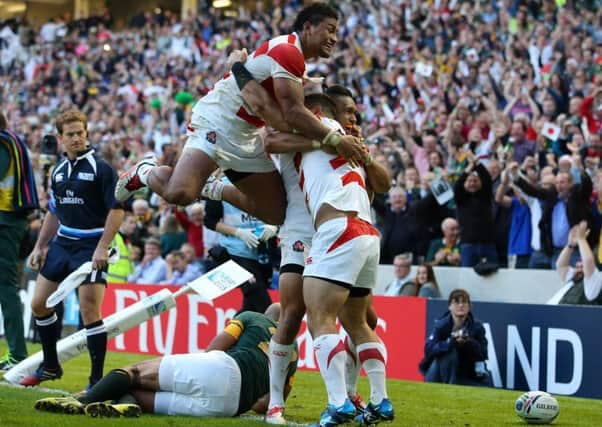As one gap closes, another opens up with England big losers


Elland Road, a cathedral of football, overrun by face-painted Scottish and American rugby fans of all ages.
The Millennium Stadium, full to the rafters, bouncing to the beat of Argentine songs and Irish oles.
Advertisement
Hide AdAdvertisement
Hide AdTwickenham – the home of English rugby – invaded by the green and gold of Australia and Welsh fans from the west.
The eighth Rugby World Cup has been a cacophony of noise and colour, the most inclusive in the tournament’s brief history.
English folk have embraced the tournament from Newcastle to Exeter, Brighton to Cardiff and a few spots in between.
A generation of people have been introduced to the game, be they the children who went with their parents to watch England try to restore a little pride in Manchester, or the speculative punters who turned up at the Amex Stadium on the second day of the tournament expecting to see South Africa wallop Japan.
Advertisement
Hide AdAdvertisement
Hide AdThat seismic shock of a result as the ‘Brave Blossoms’ stuck two fingers up at conventional wisdom and went for the try that would win the game, lit the blue touch paper on a tournament that has never wanted for drama or controversy.
Japan’s players on the pitch at the end, serenading their pocket of fans with song and sprawling on the grass for photographs are images that will live long in the memory.
In that one daring attack, Japan encapsulated the greatest accolade this World Cup can claim; the narrowing of the gap between Tier One and Tier Two nations.
There were fewer mis-matches at this World Cup than previous tournaments. True, the Springboks, Wallabies, Pumas, All Blacks and even England breached 60 points at one time or another, but no-one got near the century of points so often recorded when the haves meet the have-nots in pool games past.
Advertisement
Hide AdAdvertisement
Hide AdIf the gap has narrowed between the two tiers, then the outcome of the quarter-finals would suggest a division has been created within the elite.
Victories in all four quarter-finals for southern hemisphere teams over their counterparts from north of the equator suggests the nations who annually contest the Rugby Championship are the world’s true leaders, while the countries who compete in the Six Nations have fallen into a Tier One-and-a-half if you will.
Right now, that feeling is very raw. It may still be felt in a few months time when hostilities are renewed across Europe’s great capitals, from Edinburgh to Paris, Dublin to Rome.
But the outcome of the knockout stages were a one-off. Ireland and Wales, though they did not use them as excuses, were severely hampered by injuries when it came to the crunch, and Scotland – who played above themselves this tournament – were robbed of a famous victory over Australia by a disgraceful decision from referee Craig Joubert at the end of their quarter-final.
Advertisement
Hide AdAdvertisement
Hide AdThe less said about England the better. Their best contribution to this tournament came in their hosting of it, because they fell depressingly short on the pitch.
Knocked out on day 16, their absence beyond the third pool game had the potential to damage the tournament.
To the non-rugby fan it turned patriotism into passing indifference. Fortunately, there has been more than enough in the bone-shuddering contests that remained to keep the union fan entertained, if not the armchair punter.
Whoever wins today’s final, England have been the biggest losers. There has never been a better opportunity to grow the game, to take the deeds of the national heroes on the pitch and inject it into junior and senior rugby fields across the country.
Advertisement
Hide AdAdvertisement
Hide AdInstead, the inspiring has been done by Dan Carter and David Pocock, Nicolas Sanchez and Fourie du Preez, not Chris Robshaw and George Ford.
What was England’s greatest opportunity became their biggest waste and still they drag their feet on whether Stuart Lancaster should stay or go as head coach. But that is a debate for another day.
Today is a day for celebrating two wonderful teams going toe-to-toe for the right to be called world champions, and a day to remember all the colour and fervour created by a truly absorbing Rugby World Cup.